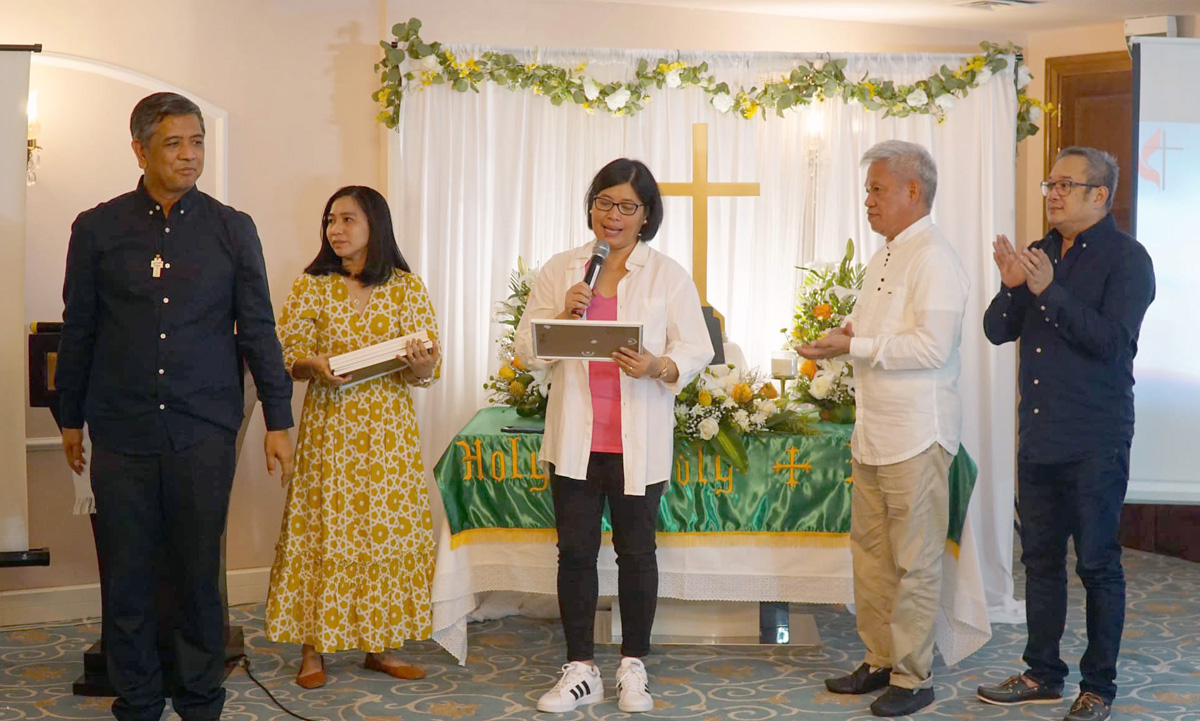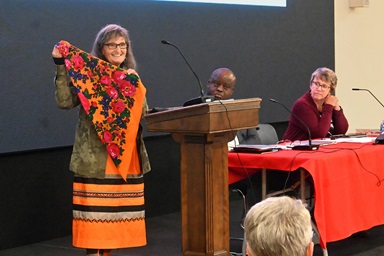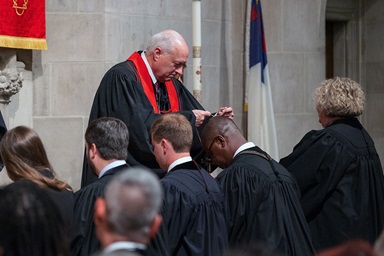Key Points:
- Global Filipino United Methodist Movement has identified Filipino diaspora congregations and fellowships in at least 14 countries across Europe, Asia, Australia and the Middle East.
- The goal is to assist churches in diaspora in organizing Filipino United Methodist ministries, revitalizing existing programs and developing new leaders.
- The Rev. Nelson Castorillo, who consults for the National Association of Filipino-American United Methodists, expressed hope that the Global Filipino United Methodist Movement would “uplift … the entire denomination.”
Against the backdrop of more than 7,600 U.S. congregations leaving The United Methodist Church in recent years, the Global Filipino United Methodist Movement remains committed to bringing Filipinos into the denominational fold.
“From the get-go, the movement itself is really for unity,” said the Rev. Edgar De Jesus. He is the former president of the National Association of Filipino-American United Methodists, which launched the movement before the 2019 General Conference.
Today, De Jesus leads Plank Chapel and Bethel United Methodist churches in Kittrell, North Carolina.
“We’re not encouraging fragmentation and separation,” De Jesus said.
The goal of the movement is to assist churches in diaspora in organizing Filipino United Methodist ministries, revitalizing existing programs and developing new leaders.
The Global Filipino United Methodist Movement urges diaspora churches to focus on the “mission and ministry of making disciples of Jesus Christ to transform the world,” De Jesus added.
Although COVID-19 impeded many of its initial programs, a Facebook group, Zoom calls and webinars helped to connect with church leaders. The National Association of Filipino-American United Methodists also engaged Filipino churches around the world to participate in virtual prayer meetings at the height of the pandemic. Two fundraisers were organized to support clergy members and deaconesses serving the Philippines Central Conference.
The Global Filipino United Methodist Movement has identified Filipino diaspora congregations and fellowships in at least 14 countries across Europe, Asia, Australia and the Middle East.
In June 2022, a month after the launch of the Global Methodist Church — a theologically conservative, breakaway denomination — the association released a statement of unity. It urged Filipino churches in the diaspora not to join the new denomination and affirmed its commitment to strengthening the global movement of Filipino United Methodists. During its 17th Convocation and Young Leaders Summit held the following year in Hawaii, the association reiterated its commitment.
An estimated 1.96 million Filipinos work overseas, according to the Philippine Statistics Authority, though that number could be up to five times greater.
The Rev. Ben Vinluan, who served the California-Pacific Conference for more than 50 years, described the movement as “a loose aggrupation of Methodists who happen to be Filipinos.” A Philippine English term, “aggrupation” is “an association linked by a common interest.”
“We see ourselves as catalysts,” he said, “a prophetic voice in the diaspora for the sake of maintaining our godly heritage and Wesleyan brand of Christianity.”
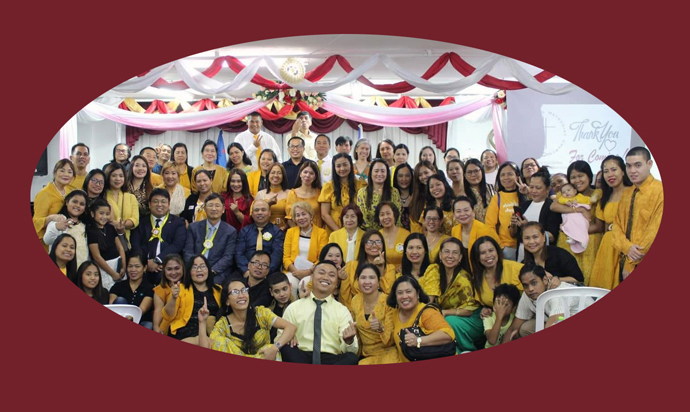
A founding member of the National Association of Filipino-American United Methodists, Vinluan said the global movement for Filipino United Methodists mirrors a key aim of the association he helped create 39 years ago: to keep Filipino United Methodists within The United Methodist Church and empower them to evangelize.
“The strength of our community,” he said, “depends on being able to assess and affirm our cultural and religious heritage without being apologetic about it, but at the same time, transcending it.”
The Rev. Nelson Castorillo consults for the association’s Filipino Vitality Commission, which equips Filipino leaders and helps jumpstart new faith communities. He expressed hope that the Global Filipino United Methodist Movement would “uplift … the entire denomination.”
In conversations before the Global Filipino United Methodist Movement creation, De Jesus and Castorillo centered on enabling some 6,000 Filipino United Methodists in the United States to learn of the stories and struggles of their counterparts in the Philippines and beyond.
“We need to help them in resourcing and connections … that will help them thrive in their ministries,” Castorillo said. He is the senior pastor of First United Methodist Church of National City in San Diego.
Although Middle Eastern countries have varying degrees of religious tolerance, the area has been a center of growth for Filipino diaspora faith communities. The United Methodist Church in the United Arab Emirates has around 500 members, with congregations in eight cities.
“Our approach on mission is very intentional in building relationships,” said Pastor Marianne Bucud. “We’re warm and personal toward our brothers and sisters in Christ.” Bucud leads the 100-member Sharjah United Methodist Church, about 20 minutes from Dubai.
“The contribution of the Global Filipino Movement will be important,” she said. “We need to think and act globally, and NAFAUM training our leaders here to have a more global mindset will be helpful.”
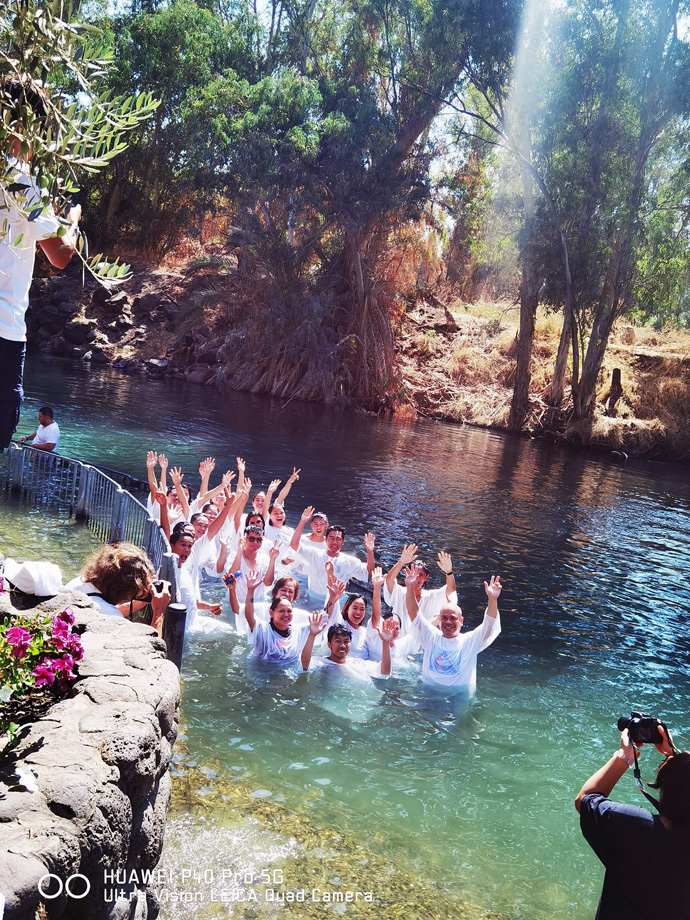 A water baptism ceremony at the Jordan River organized by Israel First United Methodist Church in Tel Aviv, Israel, Sept. 18, 2022. The church has over 100 members, around 70 of whom are called affiliate members or those who have United Methodist ties in the Philippines. Photo courtesy of Israel First United Methodist Church Facebook page.
A water baptism ceremony at the Jordan River organized by Israel First United Methodist Church in Tel Aviv, Israel, Sept. 18, 2022. The church has over 100 members, around 70 of whom are called affiliate members or those who have United Methodist ties in the Philippines. Photo courtesy of Israel First United Methodist Church Facebook page. Bucud, who served for 14 years as a volunteer lay leader at First United Methodist Church Dubai, also holds a full-time job in the American School of Dubai. She said her counterparts in the United States have more resources and connections than pastors do in the Middle East.
“The pastors here are overseas Filipino workers,” Bucud explained. “We’re not pastors who finished seminary. It will be great if (the movement) can help us boost our knowledge globally and empower our lay leaders.”
In December 2023, during a national holiday in the United Arab Emirates, more than 300 Filipino United Methodist leaders from across the region gathered in Al Ain, nine miles from Dubai, for an annual meeting. Bishop Rubynell Estrella of the Manila Episcopal Area led the gathering under the theme, “United, Rekindle the Flame in the Middle East.”
In Israel, Pastor Danny Vidad helped establish the First United Methodist Church in Tel Aviv, believed to be the only United Methodist congregation in the country. It has over 100 members.
Describing the movement’s advocacy and mission as “very timely,” Vidad met De Jesus in June 2023, and the Filipino American leader counseled him to plot out the vision of the church for the next 10 years. De Jesus advised Vidad to guide his members both spiritually and socially. Most are Filipino overseas workers.
Subscribe to our
e-newsletter
Despite Israel being in a state of war, members are steadfast in attending Friday or Saturday evening services. In many instances, they must seek shelter in the middle of the service when a rocket warning siren goes off.
“Thankfully, our church is near the stairs, which acts as a shelter,” Vidad said.
David W. Scott, director of mission theology at the United Methodist Board of Global Ministries, is an expert on the history of Methodism’s expansion. He said that the idea of immigrant groups in the United States maintaining ties with their countries of origin and diaspora is not a new phenomenon in Methodism. He noted that early American Methodism was essentially a British diaspora.
“Methodism has always been a very mission-oriented tradition,” Scott said, “and when people are evangelizing or reaching out, I think the most natural place to start that process is with people you know.”
Scott also mentioned that Filipino Methodists’ deep embrace of holiness piety, which stems from “a holiness theology shared among the Philippines and the U.S. in the early 20th century,” and explains that the concept of revival, mission and unity is significant to them.
The National Association of Filipino-American United Methodists will support regionalization in the forthcoming General Conference and will co-sponsor events for delegates, said Karen G. Prudente, who succeeded De Jesus as president of the association this year.
“Filipino United Methodists who are voting members of their GC and annual conference delegation in the USA and the Philippines determine our destiny and connectional relationships,” she said.
De Jesus will remain involved in the global movement during consultations with diaspora church leaders. An in-person gathering of Filipino diaspora congregations is planned for 2025.
Galaraga is a freelance religion reporter based in Queens, New York.
News media contact: Julie Dwyer at (615) 742-5470 or newsdesk@umnews.org. To read more United Methodist news, subscribe to the free Daily or Weekly Digests.

